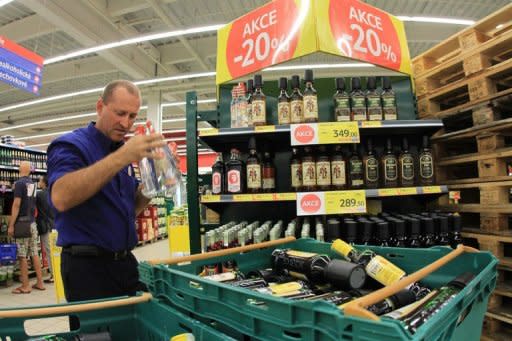Bars, drinks makers suffer amid Czech ban on spirits
Czech bars and drink producers were counting losses Wednesday as a blanket ban on spirits sales has trimmed their earnings amid an unprecedented wave of alcohol poisonings that has claimed 23 lives. "In terms of pure maths, the loss for producers reaches about 15 million koruna a day (604,000 euros, $786,000)," Jiri Janousek, spokesman for the Czech Association of Spirits Producers and Importers, told AFP. The ban on sales of liquor with over 20 percent alcohol, in force since last Friday, is an equal scare for bars and restaurants which are facing huge losses from each unsold glass while customers cancel bookings in fear of missing their favourite tipple. "We had 50 places booked for Saturday, and 40 were cancelled," the DNES broadsheet daily quoted a restaurant landlord from southern Czech Republic as saying. The state also gets hurt, losing 130 million koruna in sales tax every week, the daily added. Local spirits producers were taken aback by a ban on Czech spirits imports declared on Tuesday by neighbouring Slovakia, which buys alcohol worth over 600 million koruna every year, according to the Lidove noviny broadsheet. Slovakia reported at least four people hospitalised with alcohol poisoning on Sunday after a party over plum brandy imported from the Czech Republic. "We consider the ban on Czech liquor imports to Slovakia disproportionate because the poisoning was caused by spirits bought over the internet," said Janousek, who is also spokesman for the largest Czech spirits maker Stock Plzen. Poland meanwhile banned the sale of all Czech-made alcohol except for beer and wine on Sunday after five deaths were recorded in the past two weeks, though they were not necessarily linked. Under pressure from local spirits makers who have already sent a complaint over the prohibition to the European Commission, the Czech government is mulling ways to lift the ban as soon as possible. "The measure is not sustainable in the long run. It hurts producers who pay taxes as well as restaurant owners," Prime Minister Petr Necas told reporters on Wednesday. "Our priority must be the fastest possible renewal of a proper market in spirits and ethanol in the Czech Republic," he added, proposing new customs stamps that would be impossible to forge as one of the measures. Necas, the head of a centre-right cabinet, also said the prohibition -- the first such step in the country of 10.5 million that has the world's second highest adult alcohol intake after Moldova -- was "a necessary and correct step." But Vaclav Klaus, the Czech president and an economist by profession, disagreed, calling the ban "a strong-mouthed, easy solution" that will be "very difficult to lift." Local media said more than 40 people were in hospital with methanol poisoning. Czech police spokeswoman Stepanka Zatloukalova told AFP the poisonings "claimed 23 lives, while 30 have been charged and 13 placed in custody." "We have definitely made some progress in the investigations, but we have no information we would like to disclose right now," she added. Necas meanwhile said the police were gradually working their way into the "highest storeys of this organised mafia structure." "There are no financial limits on the deployment of the police on the case. The case must be investigated and the whole distribution chain must be uncovered and identified," Necas added.



